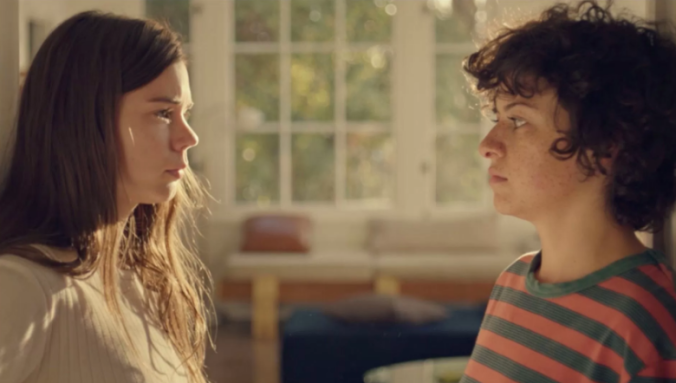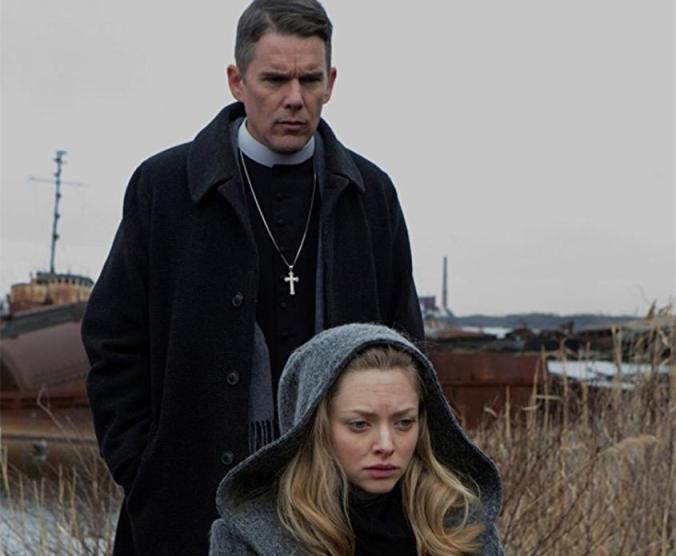
NOTE: Spoilers within.
“Twelve months. Can I keep up an exercise that long?” – Rev. Ernst Toller, First Reformed
“We can fucking skip time.” – Sergio, Duck Butter
I’m going to let you in on an uncomfortable truth: We’re all going to die someday. It’s a devastating reality we spend most of our time trying to ignore – that life on Earth is merely one long, eventful prolongation of the inevitable. With that knowledge, the question is this: How do we go about finding a point in living when our lives are going to end anyway?
Our mortality as a species and the search for meaning amidst an impermanent existence are hardly new concepts – indeed, they’ve regularly consumed our public discourse and our art seemingly since the beginning of time. They’re also the surprising common link between a tense, introspective, highly-stylized religious psychodrama from the writer of Taxi Driver and a brightly-colored indie mumblecore romcom co-penned by an Arrested Development cast member.
Paul Schrader’s First Reformed and Miguel Arteta’s Duck Butter are two of the most striking and thought-provoking movies released this year. At a glance, they seem totally incongruous, but closer examination reveals some striking parallels between the way in which both films grapple with these unsettling philosophical questions. The protagonists of both stories undertake unorthodox methods in their search for an answer to these questions – only to eventually discover that they are taking the wrong approach with the wrong motivations.
The comparison begins with the central characters themselves. In First Reformed, Schrader grants us a gruelingly vivid window into the life of Rev. Ernst Toller (Ethan Hawke), an ex-military chaplain who presides over a historically significant but poorly-attended Dutch Reform church in upstate New York. The loss of his son in the Iraq War several years prior weighs heavy on Toller’s conscience and has left the reverend in a state of supreme doubt and despondency. Like his idol, Thomas Merton, he decides that isolating himself from the outside world is the only way to experience the divine. A heavy drinker developing the early warning signs of stomach cancer, he lives out his never-ending dark night of the soul in a crumbling 250-year-old parsonage that’s decaying just as much as his physical and mental state. His encounter with troubled environmental activist/soon-to-be father Michael Monsana (Philip Ettinger) – as well as Michael’s subsequent suicide – leaves Toller with a sense of horrified hopelessness about the Earth’s demise that sends him spiraling even deeper. He retreats farther into himself, disregarding the concerned counseling of megachurch pastor Joel Jeffords (Cedric “The Entertainer” Kyles) and Esther (Victoria Hill), a choir director and Toller’s ex-lover. His frantic thoughts are communicated via voiceover in the form of entries in a journal Toller plans to keep for a year and then destroy – as he sees it, the journal is a spiritual exercise, “another form of prayer.”
Duck Butter centers on Naima (Alia Shawkat, making her screenwriting debut), a young L.A.-based actress who has just snagged a role on the latest project from indie multi-hyphenates extraordinaire Mark and Jay Duplass (playing themselves, unsurprisingly – they also produced Arteta and Shawkat’s film). Like Toller, Naima is very much a social outcast – she’s just as out-of-place on the Duplasses’ set as the gloomy, austere Toller is at a youth group meeting. When she accompanies her friend Julia (Mae Whitman) to a bar, we see her hanging back timidly in the shadows – and when she does interact, it’s with a trio of visibly uncomfortable older women whom she lectures on climate change (which she likens to an all-you-can-eat buffet scenario wherein their generation has ordered everything and hers has to pay for it).
Naturally, Naima is taken instantly by the brash, outgoing Sergio (Laia Costa), whom she watches interrupt a stage performance to share a kiss with a total stranger. They spend the night together – the first of many sex scenes in a movie that offers perhaps the most remarkably tender, organic, and real depictions of queer sex and women’s bodies I’ve ever seen on film – and confide to one another their past relationships that crumbled due to lack of trust. It’s then that the two conspire to embark on an immersive creative exercise of their own: Stay together for 24 hours, having hourly sex and generally striving to become as intimate as possible. Naima is hesitant at first, but her realization that she has “never actually gotten close enough to somebody to love them” – compounded with the loss of her Duplass Bros. gig – inspire her to dive right in.
Naima’s fixation on the end of the world mirrors Toller’s, and it appears to come from the same place of despair and insecurity; Toller describes it as “a development of pride so great that it chooses one’s certitude rather than admit that God is more creative than we are.” The two films identify self-loathing as a particularly destructive form of narcissism – we wallow in our own fears and guilts, and it eats away slowly at our souls until we’re left with nothing but our own numb anguish. In an encapsulated video mini-sermon, Jeffords suggests to his faithful that our anxiety and worry are not signs of “how wise we are,” but rather “how wicked we are” – a bit of an extreme stance, maybe, but he’s on the right track.

Just as Naima feels at first that she can finally be herself around Sergio, Toller only seems to be at peace when he is with Mary (Amanda Seyfried), Michael’s pregnant widow. Whether they’re in prayer together, bike riding in a local park, or engaging in the now-infamous “Magical Mystery Tour,” the two have a fellowship that neither seems to share with any other person. It’s easy to see the characters of Mary and Sergio as nothing more than convenient catalysts for the protagonists’ self-actualization. Indeed, they come dangerously close to embodying the “manic pixie dream girl” archetype. Fortunately, Seyfried and Costa portray their characters with enough dimension and pathos to sidestep the trope.
Despite a seemingly strong start, Butter’s intimate experiment begins to waver as soon as outside parties find their way into Naima and Sergio’s sphere. We already detect plenty of notes of suspicion, dishonesty and impatience in their relationship even before their uncomfortable breakfast with Sergio’s mother Susana, who frankly addresses Naima on sexual freedom. “Sex is so enjoyable,” she says with a knowing half-grin, “and I think the reason why is that it’s so impersonal. It’s not like love…you don’t have to be peaking up and like ‘I need you!’ No – it’s more free.”
Here Naima realizes – as do we – that she’s entered her intimacy pact with an erroneous attitude. Sex is great, sure – but it’s not necessarily the same thing as intimacy – just like intense suffering does not necessarily equal religious conviction or closeness to God. Jeffords makes this truth all too clear to Toller during a particularly fiery admonition: “You’re always in the Garden. Even Jesus wasn’t always in the garden. He was on the Mount…in the marketplace…in the temple. But you – you’re always in the Garden. For you, every hour is the Darkest Hour.”
The true breaking point in Butter comes when Naima suggests inviting Sergio’s friends Kathy (Kate Berlant) and Faye (Hong Chau) for an orgy – a clear act of desperation proffered as a way of avoiding having to spend any more time alone with Sergio. Needless to say, the plan is unsuccessful, and in an intense, tearful final confrontation, Naima confesses that she’s terrified of Sergio and can’t be with her anymore. “Thank you!” Sergio declares in response to this revelation. “Thank you for being honest for one fucking minute in 24 hours!”
It’s the implications of the films’ endings, however, that most merit a more in-depth look. In the already-iconic final minutes of Reformed, we watch Toller contemplate destroying his own church with a suicide vest, wrap himself in barbed wire, attempt suicide by drain cleaner – until Mary steps in, and they passionately embrace. Butter concludes a bit more subtly: Naima lies awake in bed, the little stray dog she’s taken in curled up next to her. By force of habit – as Sergio keenly pointed out earlier in the movie – her hands lock into fists, tightly clutching the front of her shirt. Aware of herself, she unclenches her fists – and then decides to clench them again, just as she closes her eyes. It’s a blink-and-you’ll-miss-it act of self-embrace that bears just as much devastating power as Reformed’s frantic finale.
Ultimately, Butter and Reformed are parables of self-love and self-care – far healthier, more productive strains of “narcissism.” Toller and Naima reach this common destination via similar yet opposite pathways – Toller by cutting himself off from the world, and Naima by trying to attach herself to a single person. They learn that caring for oneself – be it in the form of abandoning the celibate life that has driven you to suicidal despondency, or just accepting your own little quirks as integral parts of who you are – is the key to carrying out a worthwhile life.
While meeting with Michael early on in Reformed, Toller speaks of the contradictory truths of despair and hope: “Courage is the solution to despair. Reason provides no answers…A life without despair is a life without hope. Holding these two ideas in our head is life itself.” This paradoxical duality is the shared crux of these two existential crisis narratives. Relationships, no matter how passionate, end – often through forces beyond our control. No matter how zealously we fight to save it and the planet itself is going to end someday. And yet we soldier on through life, making the best of what we have while we still have it. Sergio puts it in simpler terms: “We have an end. So what can we do until now? Be depressed about it?”
Neither Butter nor Reformed ever find any concrete answers regarding the meaning of life – hell, there more than likely aren’t any concrete answers out there. What they do offer is a vital message for the pathological worriers of the world (among whose numbers I very much count myself). The message? It’s perfectly normal to worry, but you don’t have to let it get the best of you. If you spend all your time wallowing in your own bullshit and blindly fumbling for some kind of profound meaning, you’ll miss out on your own life as it’s unfolding before you. There’s nothing wrong with being glad you’re alive – or with giving yourself a break on those days when being alive isn’t all that fun. The meaning of life, as it turns out, ultimately depends on you. As Patricia Arquette says to Nicolas Cage at the end of 1999’s Bringing Out the Dead (another brilliant Schrader-screenwritten work with heavy religious undertones): “No one asked you to suffer. That was your idea.”